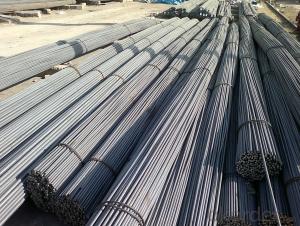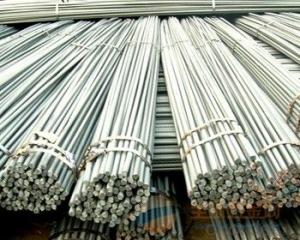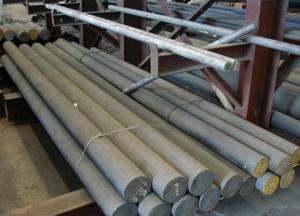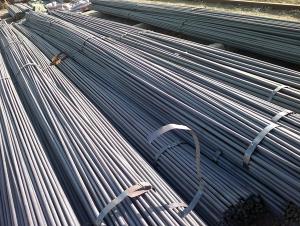Carbon steel round bar for construction
- Loading Port:
- Tianjin
- Payment Terms:
- TT or LC
- Min Order Qty:
- 25 m.t.
- Supply Capability:
- 100000 m.t./month
OKorder Service Pledge
OKorder Financial Service
You Might Also Like
Product Description:
OKorder is offering carbon steel round bar for construction at great prices with worldwide shipping. Our supplier is a world-class manufacturer of steel, with our products utilized the world over. OKorder annually supplies products to European, North American and Asian markets. We provide quotations within 24 hours of receiving an inquiry and guarantee competitive prices.
Product Applications:
Carbon steel round bar are ideal for structural applications and are widely used in the construction of buildings and bridges, and the manufacturing, petrochemical, and transportation industries.
Product Advantages:
OKorder's steel round bar RB are durable, strong, and resist corrosion.
Main Product Features:
· Premium quality
· Prompt delivery & seaworthy packing (30 days after receiving deposit)
· Corrosion resistance
· Can be recycled and reused
· Mill test certification
· Professional Service
· Competitive pricing
Product Specifications:
1. Grade: Q235, SS400, S235JR, A36
2. Sizes: Diameter: 6mm-150mm; Length: 6m, 9m, 12m or as customer’s request
3. Type: Mild steel; Low carbon steel
4. Shape: Round bar, solid bar of steel with circular section
5. Technique: Hot rolled or cold drawn
6. Mass: Mass(kg/m) = Diameter(mm)×Diameter(mm)×0.00617
Steel Type | Maximum forging temperature (°F / °C) | Burning temperature (°F / °C) |
1.5% carbon | 1920 / 1049 | 2080 / 1138 |
1.1% carbon | 1980 / 1082 | 2140 / 1171 |
0.9% carbon | 2050 / 1121 | 2230 / 1221 |
0.5% carbon | 2280 / 1249 | 2460 / 1349 |
0.2% carbon | 2410 / 1321 | 2680 / 1471 |
3.0% nickel steel | 2280 / 1249 | 2500 / 1371 |
3.0% nickel–chromium steel | 2280 / 1249 | 2500 / 1371 |
5.0% nickel (case-hardening) steel | 2320 / 1271 | 2640 / 1449 |
Usage and Applications of Carbon Steel Round Bar
Carbon steel round bar is the most common form of steel because its price is relatively low while it provides material properties that are acceptable for many applications, more so than iron. It is often used when large quantities of steel are needed, for example as structural steel. The density of this product is approximately 7.85g/cm³ and the young's modulus, like all steels.
Packaging & Delivery of Carbon Steel Round Bar
Packaging Detail: All goods are packed in bundle with steel strips and shipped by break bulk vessel or container (depend on target market and different ports)
Delivery Detail: 45 days
Trade terms: FOB, CFR, CIF
MOQ: 25 tons per specification; we can negotiate the quantity if the specification is normal or we have stock of one specification.
Weight: The price invoicing on theoretical weight basis or actual weight basis depends on customer’s request.
Shipment: The shipment of bulk break or container is depends on customer’s request and the situation of the port of destination.
Documents given: Full set of original clean on board bill of lading; Original signed commercial invoice; Original packing list; Policy of insurance; Certificate of origin and what the target market needs.
Production Flow of Carbon Steel Round Bar
1. The common processes are preheated forging quenching, dual refinement solution process, cooling quenching and isothermal quenching. We use heat treatment for dual refinement solution process. The main measures process is high temperature solution and refinement cycle. High temperature solution can improve the carbide morphology and particle size. The aim is to make the loop refinement ultrafine austenite grains.
2. EAF+LF+VD+ Forged+ Heat Treatment
FAQ:
Q1: How do we guarantee the quality of our products?
A1: We have established an advanced quality management system which conducts strict quality tests at every step, from raw materials to the final product. At the same time, we provide extensive follow-up service assurances as required.
Q2: What makes stainless steel stainless?
A2: Stainless steel must contain at least 10.5 % chromium. It is this element that reacts with the oxygen in the air to form a complex chrome-oxide surface layer that is invisible but strong enough to prevent further oxygen from "staining" (rusting) the surface. Higher levels of chromium and the addition of other alloying elements such as nickel and molybdenum enhance this surface layer and improve the corrosion resistance of the stainless material.
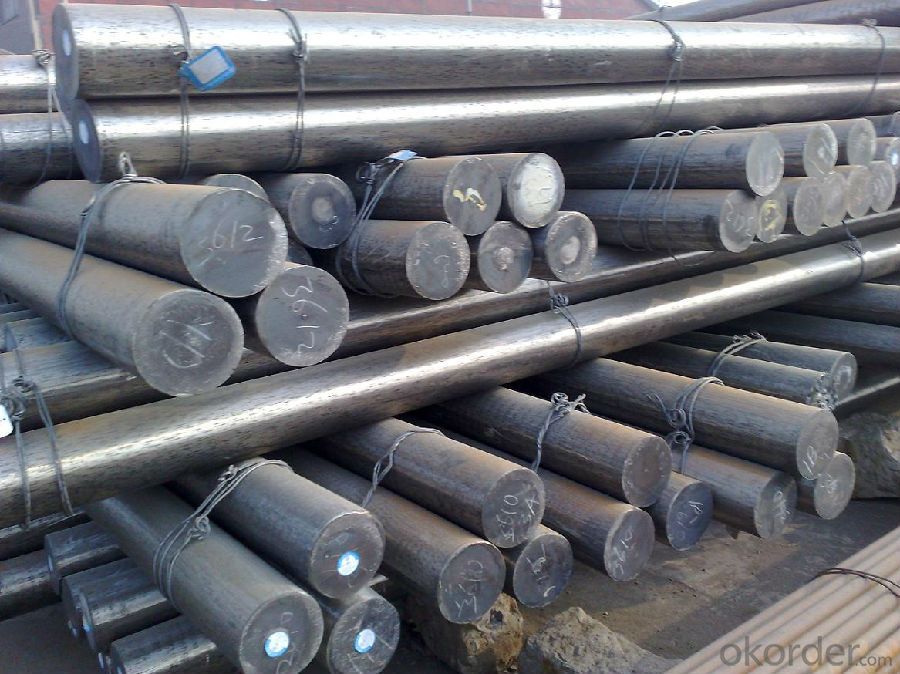
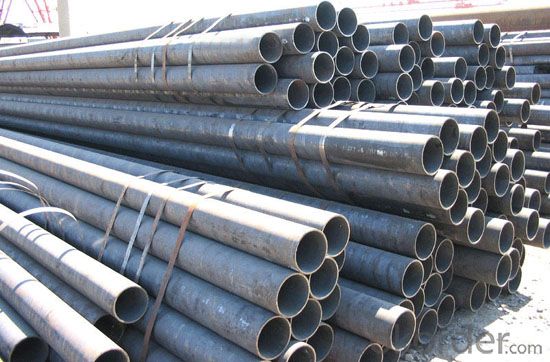
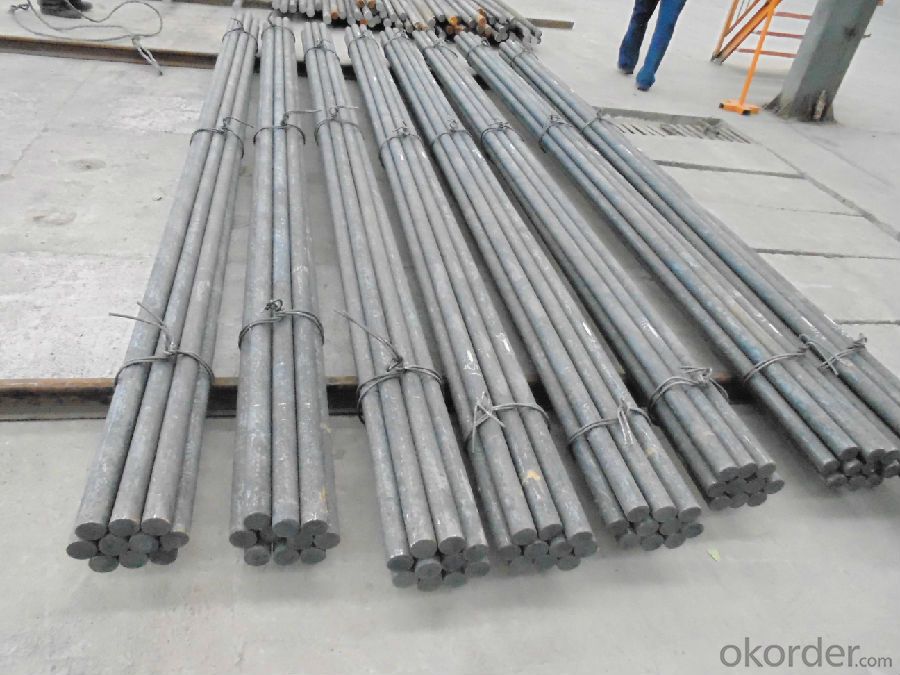
- Q: What are the considerations for selecting the right steel grade for a round bar?
- When selecting the right steel grade for a round bar, there are several considerations to be taken into account. Firstly, it is important to consider the intended application of the round bar. Different steel grades have varying properties that make them suitable for specific purposes. For example, if the round bar will be used in a high-temperature environment, a steel grade with excellent heat resistance such as stainless steel or high-alloy steel would be ideal. On the other hand, if the round bar will be used in structural applications, a steel grade with good strength and ductility, such as carbon steel, may be more appropriate. Another consideration is the desired mechanical properties of the round bar. This includes factors such as the required tensile strength, yield strength, hardness, and toughness. These properties can vary significantly between different steel grades, so it is important to choose a grade that meets the specific requirements of the application. The corrosion resistance of the steel grade is also an important consideration. If the round bar will be exposed to corrosive environments, such as in marine or chemical applications, a stainless steel grade with high resistance to corrosion would be recommended. Alternatively, if corrosion resistance is not a major concern, a carbon steel grade may be more cost-effective. Cost is another factor that should be taken into consideration when selecting a steel grade for a round bar. Different steel grades have varying costs based on factors such as availability, demand, and manufacturing processes. It is important to balance the desired properties of the round bar with the available budget to ensure cost-effectiveness. Furthermore, it is important to consider the manufacturability of the steel grade. Some steel grades may be more difficult to machine or weld, which can impact the production process and cost. It is important to choose a steel grade that is readily available and can be easily processed to meet the required specifications. Lastly, it is always advisable to consult with steel suppliers, engineers, or metallurgists to ensure that the chosen steel grade aligns with the specific requirements of the application. They can provide valuable insights and recommendations based on their expertise and experience in the industry.
- Q: Are steel round bars susceptible to rust?
- Yes, steel round bars are susceptible to rust if they are not properly protected or coated.
- Q: Can steel round bars be customized or fabricated?
- Yes, steel round bars can be customized or fabricated to meet specific requirements. Steel round bars are commonly used in various industries such as construction, manufacturing, and engineering. They can be customized in terms of diameter, length, surface finish, and even material composition. Customization of steel round bars can be done through various processes. For example, the bars can be cut to the desired length using techniques like sawing or shearing. They can also be bent or shaped using heat and mechanical force to achieve specific angles or curves. Additionally, the surface finish of the bars can be altered through processes like grinding, polishing, or coating. Furthermore, steel round bars can be fabricated to include additional features or components. For instance, holes or slots can be drilled or machined into the bars to accommodate other parts or fasteners. They can also be threaded or grooved to allow for easy assembly or connection with other components. In summary, steel round bars can be customized or fabricated in various ways to suit specific needs. Whether it is altering the dimensions, shape, surface finish, or adding additional features, steel round bars offer flexibility and versatility in meeting different requirements across industries.
- Q: Can steel round bars be used for making turbine blades?
- Using steel round bars to make turbine blades is not possible. Turbine blades experience high temperatures and extreme forces, so they need to be durable and flexible. Steel round bars do not have the required properties to endure these conditions. Usually, turbine blades are constructed from materials like titanium alloys or advanced composites, which have a high strength-to-weight ratio, exceptional fatigue resistance, and thermal stability. These materials are purposely designed to withstand the challenging conditions of turbine operations, ensuring efficiency and reliability.
- Q: Can steel round bars be used in the manufacturing of heat exchangers?
- Heat exchangers can indeed utilize steel round bars in their manufacturing process. Due to its exceptional strength and thermal conductivity, steel is frequently employed in the construction of heat exchangers. By shaping and welding steel round bars, a range of sizes and forms can be achieved, enabling the creation of crucial heat exchanger elements like tubes, headers, and baffles. Furthermore, the durability and corrosion resistance of steel make it an ideal choice for numerous industrial applications that demand efficient heat transfer.
- Q: What is the difference between a cold finished and a hot rolled steel round bar?
- The main difference between a cold finished and a hot rolled steel round bar lies in the manufacturing process. Cold finished steel round bars undergo a process called cold drawing, where they are pulled through a die at room temperature to achieve the desired shape and size. This process enhances the precision and surface finish of the steel, resulting in a smoother and more polished appearance. On the other hand, hot rolled steel round bars are formed by heating the steel billet or ingot to high temperatures and rolling it through a series of rollers, which creates the desired shape. Hot rolled steel round bars typically have a rougher surface texture and may contain imperfections due to the rapid cooling process. Overall, cold finished steel round bars are known for their superior dimensional accuracy and surface quality, while hot rolled steel round bars are more cost-effective and suitable for applications where a smooth finish is not critical.
- Q: How do you know the diameter and weight of a round bar?
- The weight divided by the length is the bottom area of 2, Wu R - is the bottom area. The diameter is equal to 2R
- Q: Can steel round bars be used in the production of agricultural equipment?
- Agricultural equipment production can benefit from the use of steel round bars. The manufacturing industry often relies on steel due to its strength, durability, and versatility. To withstand the challenges of farming, agricultural machinery like plows, harrows, cultivators, and sprayers require robust components. Steel round bars offer a solution, as they can be used to create axles, shafts, handles, and structural supports for these machines. The high tensile strength of steel ensures that the equipment can handle heavy loads and repetitive use, which are common in agriculture. Moreover, steel can be easily welded, machined, and shaped into various forms and sizes, making it suitable for a wide range of agricultural equipment applications. In conclusion, steel round bars are both reliable and cost-effective for agricultural equipment production.
- Q: Are steel round bars suitable for outdoor applications?
- Indeed, outdoor applications find steel round bars to be highly suitable. The remarkable durability and strength of steel have established it as a preferred option for numerous outdoor structures and applications. Construction, fencing, gates, outdoor furniture, and other outdoor structures frequently rely on steel round bars owing to their ability to withstand corrosion and weathering. Moreover, the resistance of steel round bars against outdoor elements can be further fortified through painting or coating.
- Q: How do you calculate the bending stress in a steel round bar?
- To calculate the bending stress in a steel round bar, you need to consider the applied load and the properties of the bar. The bending stress is a measure of the internal forces that develop within the bar when it is subjected to an external load that causes it to bend. The formula used to calculate the bending stress is: σ = (M * c) / I Where: - σ represents the bending stress (in units of force per unit area, such as pascals or psi) - M is the bending moment, which is the product of the applied load and the distance from the neutral axis of the bar to the point of interest. It is typically measured in units of force multiplied by distance (e.g., N·m or lb·ft). - c is the distance from the neutral axis to the outermost fiber of the bar. It is also known as the distance to the extreme fiber or the radius of the bar. - I is the moment of inertia, which represents the resistance of the bar to bending. It is a property that depends on the shape and dimensions of the cross-section of the bar. To calculate the moment of inertia for a round bar, the formula is: I = (π * d^4) / 64 Where: - I represents the moment of inertia - π is a mathematical constant (approximately 3.14159) - d is the diameter of the round bar Once you have determined the bending stress using the above formulas, you can compare it to the yield strength of the steel material to assess the safety factor and determine if the bar will undergo permanent deformation or failure.
Send your message to us
Carbon steel round bar for construction
- Loading Port:
- Tianjin
- Payment Terms:
- TT or LC
- Min Order Qty:
- 25 m.t.
- Supply Capability:
- 100000 m.t./month
OKorder Service Pledge
OKorder Financial Service
Similar products
Hot products
Hot Searches
Related keywords















